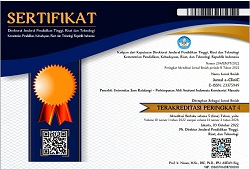Standar Fasilitas Pelayanan Forensik dan Kamar Jenazah di Era Pandemi COVID-19
DOI:
https://doi.org/10.35790/ecl.v9i2.32704Abstract
Abstract: Mortuary is one of the mandatory parts of a hospital. During the COVID-19 pandemic, the standard of morgue facilities must be a concern to prevent transmission from the corpse. The morgue needs to be designed so that it has the right placement, room design as well as equipment, so as to create a service flow that protects hospital staff and families/communities who come to mourn the corpse. Hospital management must prepare an appropriate standard of facilities, therefore, the funeral services can be carried out properly. This article aims to discuss good standards for forensic and mortuary services, and explores important options to provide mortuaries of type C and D hospitals or mobile hospitals.
Keywords: mortuary, forensic service, facility standard
Â
Â
Abstrak: Kamar jenazah merupakan salah satu bagian wajib ada di sebuah rumah sakit. Pada masa pandemi COVID-19, standar fasilitas kamar jenazah harus menjadi perhatian agar tidak terjadi penularan dari jenazah. Kamar jenazah perlu didesain agar memiliki penempatan, serta desain ruangan dan alat yang tepat, agar dapat tercipta alur layanan yang melindungi staf rumah sakit dan keluarga/masyarakat yang datang untuk melayat jenazah. Standar fasilitas yang tepat harus disiapkan oleh manajemen rumah sakit agar pelayanan jenazah dapat terlaksana dengan baik. Artikel ini bertujuan untuk membahas tentang standar pelayanan forensik dan kamar jenazah yang baik, dan mengeksplorasi pilihan penyediaan kamar jenazah bagi rumah sakit tipe C dan D ataupun rumah sakit bergerak.
Kata kunci: kamar jenazah, pelayanan forensik, standar fasilitas
Downloads
Published
How to Cite
Issue
Section
License
COPYRIGHT
Authors who publish with this journal agree to the following terms:
Authors hold their copyright and grant this journal the privilege of first publication, with the work simultaneously licensed under a Creative Commons Attribution License that permits others to impart the work with an acknowledgment of the work's origin and initial publication by this journal.
Authors can enter into separate or additional contractual arrangements for the non-exclusive distribution of the journal's published version of the work (for example, post it to an institutional repository or publish it in a book), with an acknowledgment of its underlying publication in this journal.
Authors are permitted and encouraged to post their work online (for example, in institutional repositories or on their website) as it can lead to productive exchanges, as well as earlier and greater citation of the published work (See The Effect of Open Access).






